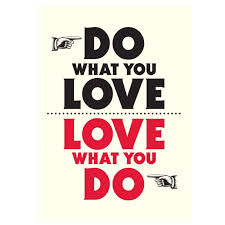
Last week my cousin Laura, a senior software developer in Chicago posted a thought provoking blog on her Facebook page excoriating the oft quoted, chirpy mantra “Do What You Love.” Laura posts interesting content so I read the blog and have been banging it around in my head for the last couple of weeks.
Down with “DWYL”
Slate Magazine writer Miya Tokumitsu (@MiyaTokumitsu) contends that the “problem with Do What You Love…is that it leads not to salvation but to the devaluation of actual work – and more importantly, the dehumanization of the vast majority of laborers.” Despite the slightly Marxist overtones of this piece, I think Miya has a point here and I tend to agree with her. They call it “work” for a reason. My cousin works with young designers who experience cognitive dissonance when they realize that even though they are doing the thing they love, they are still beholden to clients, deadlines, a boss and they hammer out work because they are required to for money. Miya goes on to say that “DWYL is a secret handshake of the privileged and a worldview that disguises it’s elitism as noble self-betterment. According to this way of thinking, labor is not something ones does for compensation but it is an act of love. If profit doesn’t happen to follow, presumably it is because the worker’s passion and determination were insufficient.” Ouch. Miya brings up other good points, such as the fact that Steve Jobs was an enthusiastic proponent of “DWYL,” yet his model relied on the labor thousands of factory workers who I would have to think, did not decide one day over latte’s and croissants to pursue their dream of working in a factory all day every day for a fixed wage.
My cousin Laura and I messaged each other back and forth regarding this blog. She found it disheartening to see colleagues who got into graphic design for example experience cognitive dissonance when the tire of passionate artistic inclination met the track of deadlines and compromised autonomy and vision. “Hey, that’s what they call it work,” she said. Were they sold a false idea when they were told during their commencement ceremony to only do what they loved?
Another Perspective
I do see a somewhat happy medium here and think the writer might be harsh in her judgment that striving to find joy in one’s work is a “privilege …a sign of socioeconomic class.” What about good teachers who work very hard for very little because of the satisfaction the work brings them? I also think that even when the work that you do for profit is not particularly joyful, you should strive to find meaning and harmony in the relationships that surround that work, be it client, employee or vendor related. You can love a job for reasons that go beyond the hammering out of a widget. So although I think Miya Tokumitsu has compelling thoughts on the peril of preaching the Do What You Love gospel, I think the conversation would benefit by broadening the context. One should be ever in pursuit of the activities that bring them happiness and satisfaction in life, whether its in work, relationships or hobbies. By putting the burden on your paid gig to bring significance and meaning to your life might be myopic. Opportunities exist in the banal moments of the day, whether it’s at work or not, where meaning and significance can be found if you’re aware and seeking opportunities to make, not just receive them.

